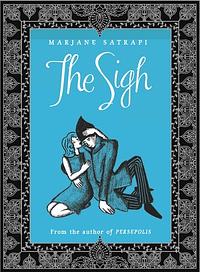Take a photo of a barcode or cover
By the author of Persepolis. A fairy tale about the fragility of life, with a strong and resourceful heroine, and beautiful illustrations by the author.
adventurous
reflective
medium-paced
Plot or Character Driven:
A mix
Strong character development:
N/A
Loveable characters:
Yes
Diverse cast of characters:
Yes
In the past year, I've been exploring the graphic novels of Iranian - French author, Marjane Satrapi. The 1st three books I enjoyed have all been non - fiction, dealing with her life, a story about an uncle and also the plight and battle for freedom of women in Iran. The Sigh, originally published in 2011, is quite different, being a short and sweet fairy tale.
The Sigh tells the story of 3 sisters, focusing on the youngest, Rose. The sisters live with their widowed father, a travelling businessman. On one trip, each daughter tells him what to buy them as gifts; a dress for the oldest, Orchid, a merino shawl for Violet and the seed of a blue bean for Rose. Unfortunately, father is only able to find the 1st two gifts on his travels.
Rose is disappointed and sighs, bringing to the home, Ah the Sigh, a sort of spirit. He provides the father with a blue bean seed but makes him promise that at some time he must grant wish to The Sigh. A year later, Ah the Sigh returns with his demand... that being that father must give up Rose to the being. After much argument, Rose says she'll go and off they ride into the night.
The rest of this short story details Rose's life in the distant land where she falls in love with Ah's master, the Prince of Sighs and the tragedy that befalls the Prince and then Rose's efforts to save him.
It's a lovely story. Rose is a strong, wonderful character, with great wisdom and sensibility. The story is short and lovingly written and illustrated and was most enjoyable to read. I've enjoyed my exposure to Marjane's stories very much. I will keep exploring. (4.0 stars)
The Sigh tells the story of 3 sisters, focusing on the youngest, Rose. The sisters live with their widowed father, a travelling businessman. On one trip, each daughter tells him what to buy them as gifts; a dress for the oldest, Orchid, a merino shawl for Violet and the seed of a blue bean for Rose. Unfortunately, father is only able to find the 1st two gifts on his travels.
Rose is disappointed and sighs, bringing to the home, Ah the Sigh, a sort of spirit. He provides the father with a blue bean seed but makes him promise that at some time he must grant wish to The Sigh. A year later, Ah the Sigh returns with his demand... that being that father must give up Rose to the being. After much argument, Rose says she'll go and off they ride into the night.
The rest of this short story details Rose's life in the distant land where she falls in love with Ah's master, the Prince of Sighs and the tragedy that befalls the Prince and then Rose's efforts to save him.
It's a lovely story. Rose is a strong, wonderful character, with great wisdom and sensibility. The story is short and lovingly written and illustrated and was most enjoyable to read. I've enjoyed my exposure to Marjane's stories very much. I will keep exploring. (4.0 stars)
adventurous
hopeful
lighthearted
mysterious
relaxing
fast-paced
"La vita non è che un sospiro."
Marjane Satrapi, l'autrice di Persepolis, che si dà al racconto fiabesco, ma con il suo solito stile personalissimo... e forse in quest'opera più che in altre c'è il riflesso della sua persona: nata in Iran, diventata adulta in Francia. Così questa fiaba ricorda per molti versi quelle europee, ma con tinte e risvolti a La mille e una notte.
Mondo distanti che si incontrano anche in una semplice fiaba, adoro la Satrapi anche per questo.
Marjane Satrapi, l'autrice di Persepolis, che si dà al racconto fiabesco, ma con il suo solito stile personalissimo... e forse in quest'opera più che in altre c'è il riflesso della sua persona: nata in Iran, diventata adulta in Francia. Così questa fiaba ricorda per molti versi quelle europee, ma con tinte e risvolti a La mille e una notte.
Mondo distanti che si incontrano anche in una semplice fiaba, adoro la Satrapi anche per questo.
I'm such a fan of Marjane Satrapi's other books that I didn't think twice about shelling out $10 for The Sigh at my local bookstore. The Persepolis series? A thought-provoking historical and personal narrative. Chicken With Plums? A heartbreaking romantic tale of Byron-esque proportions. Embroideries? A funny, insightful exploration of female relationships. The Sigh? Ummmm.... a prettily illustrated fairy tale of sorts about a woman who feels a need to punish herself after accidentally harming her lover?
I get the message Satrapi might be trying to communicate here; women sometimes make mistakes in their personal relationships. Sometimes they're out of selfishness, sometimes out of ignorance, and sometimes sheer unanticipated accidents occur. And as a result of these human failings, we may feel deep regret and guilt over the outcomes. I understand that. I've been there.
However, in The Sigh, the message is that after dragging yourself through the Valley of the Shadows, after selling yourself into slavery to atone for your mistakes, that your true love with return and you'll live happily ever after. Honestly, that kind of message bothers me. It's certainly worthy of discussion as an adult, but as this book contains the banner on the back-cover, "Suitable for readers of all ages" I don't know how I'd feel reading a book with this kind of undercurrent with a child.
Personally, I'd skip reading The Sigh as a bed-time story and wait until junior high school so we could share Persepolis and explore the rich content and lessons it contains together.
I get the message Satrapi might be trying to communicate here; women sometimes make mistakes in their personal relationships. Sometimes they're out of selfishness, sometimes out of ignorance, and sometimes sheer unanticipated accidents occur. And as a result of these human failings, we may feel deep regret and guilt over the outcomes. I understand that. I've been there.
However, in The Sigh, the message is that after dragging yourself through the Valley of the Shadows, after selling yourself into slavery to atone for your mistakes, that your true love with return and you'll live happily ever after. Honestly, that kind of message bothers me. It's certainly worthy of discussion as an adult, but as this book contains the banner on the back-cover, "Suitable for readers of all ages" I don't know how I'd feel reading a book with this kind of undercurrent with a child.
Personally, I'd skip reading The Sigh as a bed-time story and wait until junior high school so we could share Persepolis and explore the rich content and lessons it contains together.
I love Marjane's work and while this is not her strongest to date it still has all the hallmarks of her work; lovely illustrations – this was the first time I've seen her use colour to great effect – and a wonderful insight into the human condition. Nice fable which my young daughter enjoyed too.
This is more of a picture book than a graphic novel, which is how it is categorized in the library. Satrapi's illustrations are interesting and add a lot to the story, although I was surprised at how different the style was from the Persepolis series. The story is a somewhat straightforward fairytale/folktale, with a few twists that keep it modern. A few parts struck me as a bit mature for the youngest readers, but it's a delightful book for adults or slightly older kids.
The drawings were beautiful but it was a ridiculously quick read (about 10 minutes) and didn't really bring anything that interesting or new to the fairytale.




